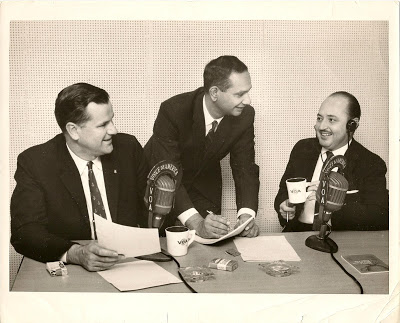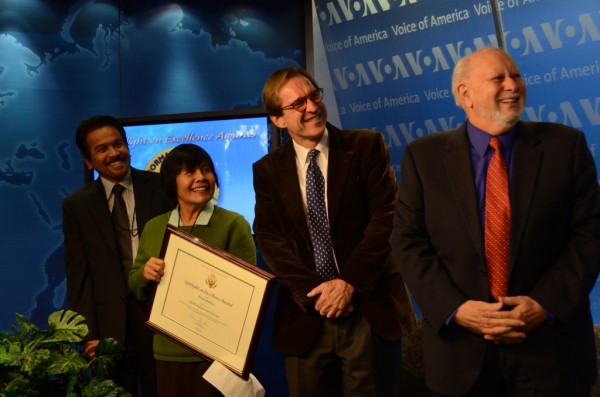
Fred Schiele, Hamid Khosrovi, Jose (Pepe) Perez Del Rio prepare for a broadcast during the Cuban Missile Cris
Fifty years ago on October 22, 1962, President John F. Kennedy made an alarming announcement to the world: The Soviets possessed nuclear missiles in Cuba capable of striking the United States.
The western world erupted into a frenzy, and VOA veteran and former Spanish Service senior producer Hamid Khosrovi watched as the events unfolded before his very eyes.
The now retired producer, who dedicated 51 years of his life serving VOA, was thrust into overdrive during this critical period.
“We were fully staffed 24/7. They started me from 9 p.m. to 11 a.m.,” recalled Khosrovi. “We had a producer on duty. Even at 11 a.m. when I was supposed to leave, I could not until someone came.”
As the crisis unfolded, news agencies across the country scrambled to gather any information pertinent to the crisis and VOA and Radio Liberty were no exceptions.
“With the world threatened with nuclear Armageddon, the United States had no better national informational vehicle than VOA to reach as many people — and leaders of influence — instantaneously and globally,” said former VOA Deputy Director Alan Heil.
In addition, Radio Liberty broadcast Russian-language newscasts to Soviet forces in Cuba using U.S. commercial A.M. transmitters, noted Woodrow Wilson Center Senior Scholar Ross Johnson.
Gene Sosin, who worked for Radio Liberty in New York, recounted how tense the situation was.
“Those days were tense for everyone in our country, and in particular for those of us who were responsible for communicating with the Soviet audience,” Sosin said, adding that the Kremlin’s reactions to Radio Liberty’s broadcasts were a good indicator that the message was getting through.
Meanwhile, VOA anxiously awaited any news from the American government and other sources, and when they received word, went on the air immediately.
“[We] put out any announcements from the White House or State Department. Sometimes we quoted newspapers like The New York Times or The Washington Post. If our division chief saw anything useful we would translate and broadcast it,” said Khosrovi.
VOA also interviewed various Latin American ambassadors to give perspective to the Crisis.
When news of the crisis was sparse, VOA drew upon what Khosrovi recalled was a “huge musical disk” to fill the airwaves.
Although the work proved difficult and the hours long, veterans like Khosrovi, Heil, and Sosin served the agency during one of the most critical periods of American history. The events of the Cuban Missile Crisis set the stage for U.S. international broadcasters as important mediums for delivering accurate and balanced news to countries with unreliable media.
In honor of the Cuban Missile Crisis’ 50th anniversary, T.V. /Radio Marti recently aired a three part series with an emphasis on the release of new information and documents, as well as CIA reports about Fidel Castro’s psychological profile.
For more information, check out the series on Martí Noticias
By Paulina Kosturos




